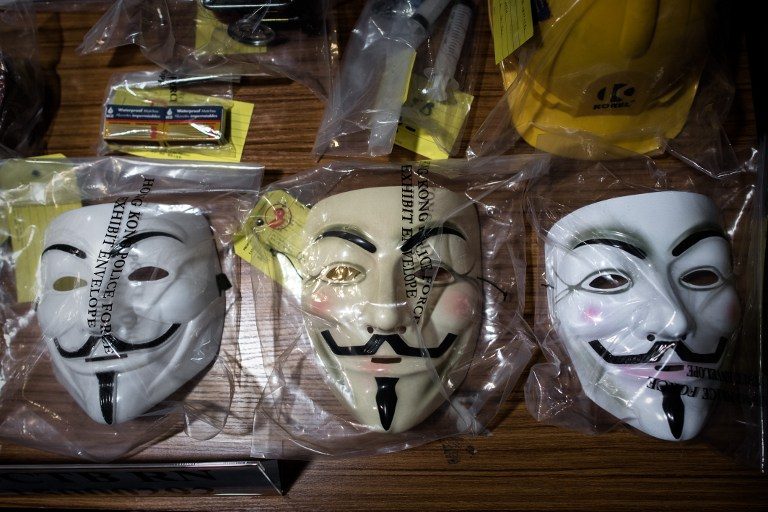SUMMARY
This is AI generated summarization, which may have errors. For context, always refer to the full article.

HONG KONG, China – Hong Kong police arrested on Monday, June 15, nine people involved in making explosives days ahead of a vote on a controversial political reform package. One of them claimed he belongs to a “radical group.”
Police would not name the group or specify motives but said that maps of central districts of Hong Kong had been found and warned anyone taking part in public gatherings to stay away from “violent protesters.”
It comes as a series of rallies take place in the lead up to Hong Kong legislature’s vote on Friday on the divisive roadmap for the city’s electoral system.
“The operation… resulted in the arrest of nine Hong Kong citizens for the offence of conspiracy to manufacture explosives,” Au Chin-chau, superintendent of the organised crime and triad bureau, told reporters.
“During police inquiries someone claimed to be a member of a local radical organisation,” said Au.
Au would not clarify how many of the group belonged to the organisation, but said “not all”.
He described the group as a “local syndicate involved in manufacturing explosives”.
The South China Morning Post and the Oriental Daily had earlier said those arrested were activists from pro-democracy “localist” groups, which have come into the spotlight in recent months.
Such groups are frustrated with the lack of progress on electoral reform and have argued that Hong Kong should distance itself from Beijing to forge its own political future.
Five men and four women were arrested aged 21 to 34 years old.
Chemicals were seized at an abandoned television studio in the eastern district of Sai Kung, with some detonated at the scene.
A house search later led to the seizure of ingredients which could be used to make TATP, “a form of high explosive”, said Au.
Maps of the central neighbourhoods of Wan Chai and Admiralty were also found, as well as a number of air rifles.
Both locations were at the heart of last year’s mass pro-democracy rallies and the government complex is in Admiralty.
Protest risk
The reform bill to be voted on lays out a proposal for choosing the city’s next leader by public vote for the first time in 2017.
But it sticks to a ruling from Beijing which stipulates that candidates must be vetted by a loyalist committee.
That ruling sparked mass rallies and roadblocks towards the end of last year, with campaigners dismissing it as “fake democracy.”
Pro-democracy legislators are vowing to block the proposal.
Au did not directly link the arrests to the protests, but warned: “Should there be any confrontations, citizens should protect their own safety, leave the scene at once and maintain a safe distance with the violent protesters.”
The atmosphere was calm outside the legislature Monday night, where around 200 people gathered to listen to speeches.
Some protesters distanced themselves from radical groups but also expressed scepticism over the arrests.
“They (the authorities) are making a fuss out of it… trying to make some people stop coming out to oppose fake democracy. But being radical is not popular,” said David Wong, 51.
“I’m not surprised if radical groups exist,” added Toppy Au, 50. “I’m not part of it but… everyone is angry in Hong Kong. Our fate is controlled by Beijing.”
Hong Kong is semi-autonomous after being handed back to China by Britain in 1997 and sees much greater freedoms than on the mainland, but there are fears that those are being eroded.
Officials from two localist groups told AFP they had no knowledge of the arrests and did not condone violence.
“Police said localist activists are making bombs, but I am not sure if it’s real or not. We have nothing to do with that,” said Jon Ho of Hong Kong Localism Power.
People Power’s Tam Tak-chi added: “People Power did not do that. Our group does not believe in violence.” – Laura Mannering and Dennis Chong, AFP/Rappler.com
Add a comment
How does this make you feel?
There are no comments yet. Add your comment to start the conversation.